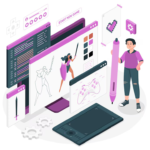In today’s fast-paced app development landscape, code sharing across mobile platforms is a powerful strategy for accelerating development, ensuring consistency, and reducing costs. Whether you’re an Android app development company or an iOS app development company, leveraging the right techniques and tools to share code effectively is crucial for creating high-quality apps.
If you’re planning to hire Android developers or hire expert iPhone developers, this guide offers essential tips to ensure seamless code sharing on mobile platforms.
1. Choose the Right Cross-Platform Framework
Modern mobile app development thrives on frameworks that allow developers to share code across Android and iOS platforms. Popular options include:
- Flutter: Google’s open-source UI toolkit supports creating natively compiled apps for mobile, web, and desktop from a single codebase.
- React Native: Backed by Facebook, React Native allows developers to use JavaScript for building cross-platform mobile apps.
- Xamarin: Ideal for C# developers, Xamarin enables you to write apps with a shared codebase.
Using these frameworks, a mobile app development company can reduce duplication and improve efficiency.
2. Modularize Your Codebase
Encapsulating functionalities into reusable modules is essential for effective code sharing. By modularizing your app’s codebase:
- Android developers and iOS developers can work on different modules independently.
- Shared business logic, such as API calls, authentication, or database handling, can reside in common modules while UI-specific code is platform-dependent.
3. Invest in a Version Control System (VCS)
Collaboration among teams is streamlined when using a robust VCS like Git. This helps developers track changes, revert to previous versions, and maintain code integrity across platforms.
If you’re planning to hire Android developers or hire expert iPhone developers, ensure they are familiar with tools like GitHub, GitLab, or Bitbucket for managing shared codebases.
4. Adopt Best Practices for Code Consistency
When teams work on shared code, consistency becomes critical. Enforce:
- Code formatting standards using tools like Prettier for JavaScript or SwiftLint for Swift.
- Code reviews to ensure uniformity and prevent bugs.
- Documentation to help current and future developers understand the shared codebase.
An experienced mobile app development company often implements these practices to maintain high standards.
5. Use Shared Libraries and Plugins
Shared libraries and plugins save significant time and effort. Examples include:
- Common SDKs for analytics, payment gateways, and push notifications.
- Platform-agnostic plugins in frameworks like React Native and Flutter, which can bridge the gap between platform-specific functionalities.
For instance, a mobile app development company working with Flutter can use Dart packages to enable code reuse across Android and iOS.
6. Leverage APIs for Cross-Platform Features
When direct code sharing isn’t feasible, APIs can help bridge the gap. Backend services can serve as a common ground for both platforms. For example:
- Centralized user authentication through APIs.
- Unified database access with tools like Firebase or AWS Amplify.
By using APIs, an Android app development company and an iOS app development company can ensure a consistent experience without duplicating code.
7. Test Code Rigorously Across Platforms
Testing is essential to ensure that shared code works seamlessly on both Android and iOS. Incorporate:
- Automated testing tools like Appium, BrowserStack, or XCTest.
- Continuous Integration/Continuous Deployment (CI/CD) pipelines to catch bugs early.
A proactive mobile app development company will always prioritize testing for smoother app releases.
8. Keep Platform-Specific Nuances in Mind
While sharing code is efficient, don’t overlook the unique characteristics of Android and iOS. For example:
- Android uses XML for UI layouts, while iOS relies on SwiftUI or UIKit.
- Navigation and lifecycle management differ significantly between the platforms.
Collaborating with teams that specialize in each platform ensures optimal performance. To that end, hire Android developers and hire expert iPhone developers who are skilled at bridging these gaps.
9. Optimize Performance for Each Platform
Performance is a key factor in mobile app success. While shared code accelerates development, you may need platform-specific optimizations. Ensure your team:
- Tailors UI components to match platform guidelines.
- Minimizes dependencies to reduce app size and enhance speed.
An experienced Android app development company or iOS app development company can expertly handle such optimizations.
10. Stay Updated with Tools and Trends
The mobile development ecosystem evolves rapidly. Regularly upgrading tools, libraries, and frameworks ensures compatibility and improved functionality. For example:
- Keeping Flutter SDK or React Native libraries updated.
- Staying informed about changes in Android and iOS development environments.
Conclusion
Effective code sharing on mobile platforms requires strategic planning, robust tools, and skilled developers. By implementing these tips, a mobile app development company can maximize productivity, minimize errors, and deliver outstanding apps for both Android and iOS users.
Whether you’re looking to hire Android developers or hire expert iPhone developers, choosing professionals with experience in cross-platform development ensures you reap the full benefits of code sharing. Reach out to a trusted Android app development company or iOS app development company today to bring your vision to life!
This blog combines actionable advice with industry-specific insights to attract businesses seeking efficient app development solutions.



